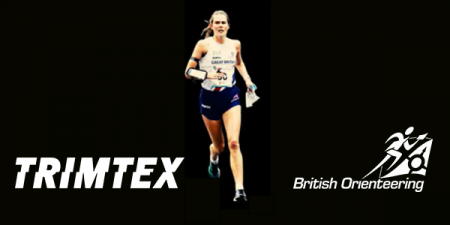Following this weekend's British Orienteering Championships 2024, we spoke to Weekend Coordinator Duncan Archer (Lakeland Orienteering Club) to learn more about the planning process for this year's event and his highlights from the weekend.
How did the North East Orienteering Association come to plan the British Orienteering Championships 2024?
Major events like the JK and British Champs rotate round the regions and home nations. NEOA has always been happy to do its bit staging these events about once every 10 years for each of JK and British. We last did the British Long and Relay in 2014, so exactly 10 years later here we are again!
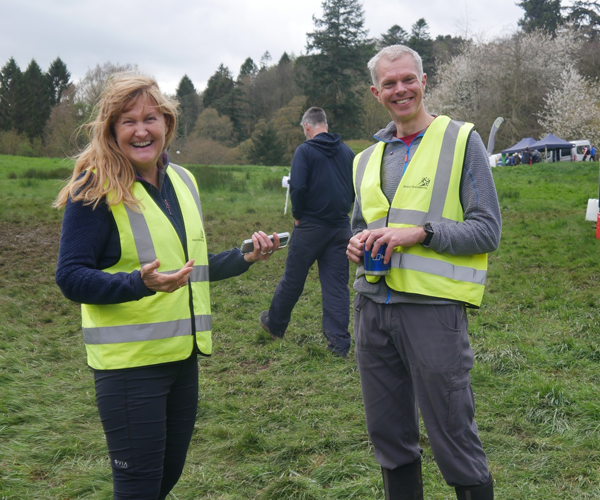
The event was based in Whitby, Yorkshire – how did you go about deciding on the final locations for both the Long Distance and Relay events?
The areas in the North East that are able to accommodate major events are either around the North York Moors (CLOK areas), or in Northumberland (NATO and NN areas), and major events we host tend to alternate between the two. We were originally staging JK 2020 near Whitby, which sadly got cancelled along with many other events due to Covid, and so it was natural to return to similar plans for BOC/BRC in 2024. I was also coordinator for the ill-fated JK 2020, so I decided to take on the role again and hopefully see it through this time (despite the fact we moved to the Lakes in May last year, but most of the coordinator’s role can be done remotely).
Mulgrave Woods was a very early candidate for JK2020 but unavailable due to access. However it became available in 2024 and is excellent for a long distance race with areas of technical detail plus options for longer route choice legs. Hutton Mulgrave and Skelder, which we were also going to use for JK 2020 relays, has a good variety of terrain, with the very best bits of natural woodland offering good running and orienteering challenge, right next to fields for arena and parking – ideal for a relay. We bused competitors on the four longest courses to a remote start in the relay area before a run through to Mulgrave to get the length without too much repetition – a similar concept that was used when the JK was here in 1996. An added bonus was both forests and the long parking were owned by a single landowner which makes life easier.
Were there any obstacles to overcome throughout the planning process?
The biggest challenge was rain and wet underfoot conditions. Through winter this was expected, but it persisted through to the event (where in previous years things have been “fine” by mid-April). It affected many things. Some junior relays needed last minute replanning around forestry work that had more impact on muddy rides than you’d expect. The conditions on the long courses were muddy and heavy going (as well as the hills!). But most notably the parking fields and arenas were very squelchy on both days. More tracking was ordered for long parking the week before the event, and we strongly encouraged car sharing (we also considered busing from remote parking but decided against it). We were hugely indebted to the assistance from Mulgrave Estates for laying tracking, firming up entrances, moving equipment, and being on hand with a tractor and ATV on day 1. Also to Austen Floyd one of the Cleveland Mountain Rescue team members (who were providing first aid cover) who happened to also have a tow truck and kindly offered his services on relay day.
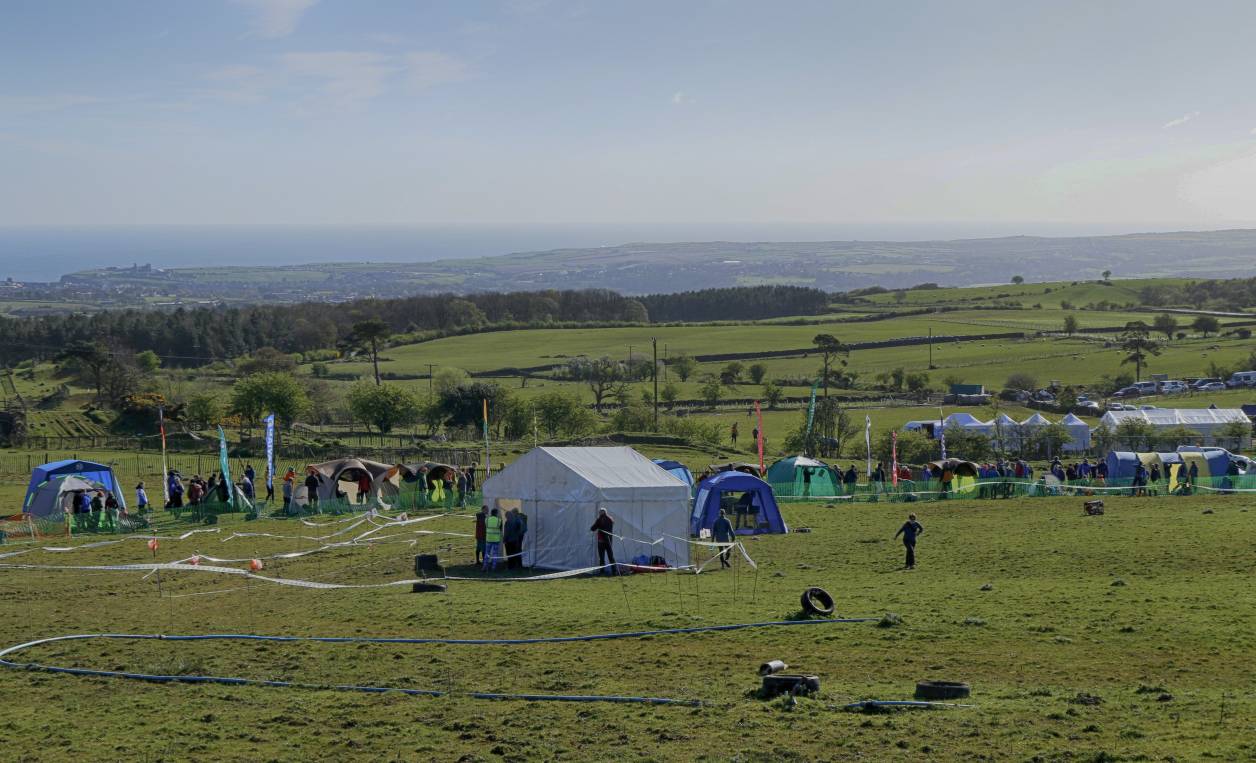
Other challenges? When you are an official at a major event you understand how much goes on behind the scenes, much of which is never apparent to competitors (although some of it sadly is). Just some examples included:
- Dealing with the safety advisory group regarding signing and turning into the relay parking off a fast and busy A road.
- Offset litho maps arriving with some print missing around a control, and some hasty reprinting.
- Worrying about low entry numbers after the first closing date. Although we landed about where we wanted in the end – including the very last entries only two days before the event (if they were happy to pay, we were happy to take their money!).
- Last minute map changes needed for forestry work in the relay area. We were fortunate to have Paul Taylor from CLOK as our mapper, who lives just down the road, so updates were swiftly accommodated.
- Logistics of coordinating equipment from lots of different sources (and getting it back).
- Putting all our volunteers into roles including accommodating desires to run on the day.
- Some particularly challenging conditions with siting commentary and power on the relay day, coupled with a whole slew of team / entry changes from club captains (I think we did well to only delay starts by 10 minutes in the end!).
Volunteers are a critical element when it comes to our events, how did you go about recruiting and engaging individuals to get involved?
It was a challenge! To put things in perspective – we had 100 volunteers at the long, and 70 at the relay. NEOA has 160 ranked members (a reasonable measure of active orienteers). Do the sums – even if all those orienteers in the North East were to help on one day we still wouldn’t have enough. Compare that with other regions – aside from Wales and Northern Ireland (even fewer orienteers than NEOA!), all other regions have at least 300 ranked members, and the biggest – SWOA, SEOA, NWOA and SOA – have over 600 each.
How did we manage? We pulled together! People helped both days. Some people, particularly team leaders, sacrificed runs (although many volunteers did also run). We had representatives in each of the three open NEOA clubs to drum up support, and our volunteer manager took requirements from organisers, and filled in positions. We also asked participants from outside the region on the entry form if they could help and got over 50 offers which was fantastic (so much so that we ended up not needing them all!).
At the end of the day, most volunteers don’t actually do it for any particular reward or recognition (although we did give helper vouchers to spend at traders at the event), and it is great to see such a spirit of volunteering in the sport. Most people are just happy to do their bit, to balance the countless times they benefit from it.
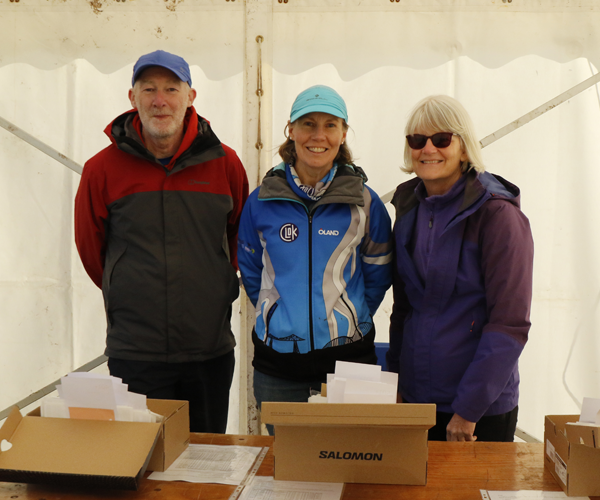
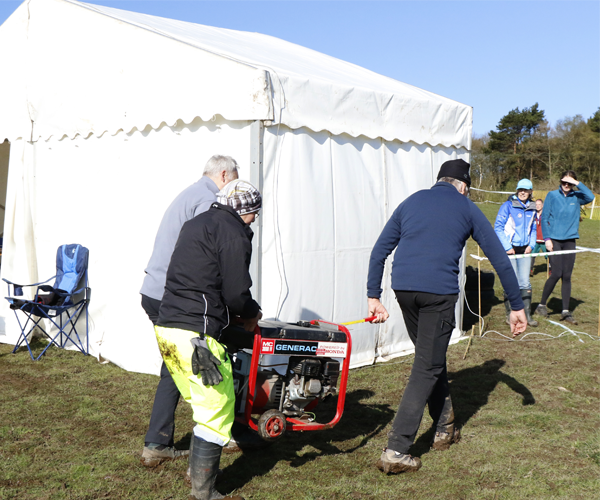
How did each day of the event unfold from your perspective as coordinator?
Standing in a waterlogged part of the long parking field as tracking was going down on Friday I could not understand how this was going to work. And on the Friday night it felt like the calm before the storm. The hard work had been done. No doubt many officials and team leaders were mentally going through their task lists for the next day, but as coordinator there wasn’t a whole lot I could do. So much so that I drafted half of this interview that evening! But I was still very stressed about parking and arena conditions.
Saturday I arrived at 7am. We managed to get traders into creative positions. The parking situation was “managed” through the morning. Competitors started to arrive in the arena, set up tents, have their runs, and everything proceeded as it should! The courses turned out to be challenging and tough – as I believe it should be for the British Championships – and people were coming back exhausted but the vast majority still happy. They were three technical complaints but we handled them according to the process, the results stood, and we got all the prizes presented with the help of special guest Steve Cram.
Sunday it again quickly became evident parking was going to be challenging. Now as coordinator, in theory by the day of the event you should have done your “coordinating”, and the other officials and team leaders should just make it happen. In reality issues come up, and I saw it as my role to just jump in where needed. In the end this involved helping direct the parking as I knew that without getting all the competitors and their cars into the field there would be no meaningful event. We did it, we overcame some challenges mentioned earlier, and the mass starts got under way. Reports from their forest were positive, and careful navigation in the heat of the head to head relay paid off, and the winners were duly crowned.
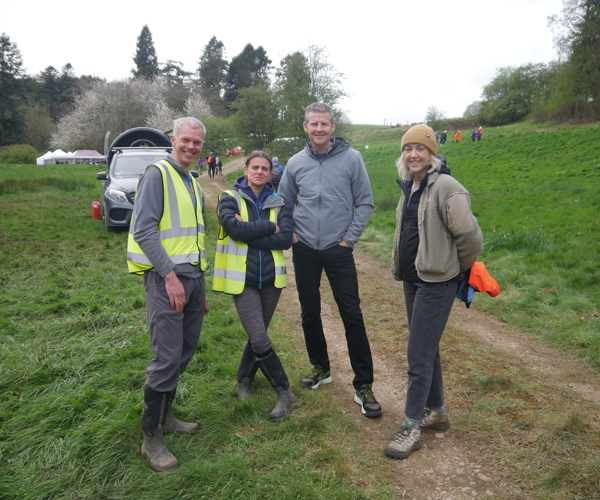
Is there any advice you would give to those who will coordinate future major events such as BOC?
Orienteering is hugely technical sport with lots of detail to organise. But two things will make or break an event. Firstly what goes on in the forest – plan good courses, get the maps correct, and get the controls in the right place. Secondly the logistics, parking and arenas – assume it will rain, and then rain some more, budget for lots of tracking, and have contingency plans (tow trucks, buying more tracking, etc.). There is much more besides but it will follow and if it doesn’t it isn’t the end of the world.
It is important is to fill your organiser, planner and team leader roles early with your best people, make sure they and their teams are briefed, and then let them do their job. My role as coordinator was to help find some of those people in the first place (I’m hugely grateful to the great team we had), join the dots between them, make sure people remained informed about what else was going on beyond their immediate role, act as the bridge to British Orienteering, and help make judgements on a whole host of questions where the way forward wasn’t obvious. I also covered some things that spanned both days (procuring various services and systems, website, medals, traders, bibs, juries, event programme etc. – several of which could have been done by others, although see previous point about number of volunteers!).
Can you share your highlights from the weekend with us?
- Seeing a deer skipping across the field as we arrived at 7am on Saturday. Little did it know what was about to go down in its back garden!
- Getting Steve Cram there to present prizes on Saturday. He became British Orienteering president in 2021, but has many other commitments in athletics, his own events company, and as a coach, and this was his first appearance at an event in the role. With the British Champs in the North East where he is from it seemed an ideal opportunity, so I asked (via the secret channels...), and was delighted when he said yes!
- Enjoying some of the forests myself. I hung relay controls on the Friday, and was waking them up on a beautiful Sunday morning. Amidst the business of the event it is nice to have some time on your own, doing what you love, finding controls with a map and compass in your hand.
- Being able to provide accommodations for a couple of competitors with particular needs. It is great how inclusive our “sport for all” can be.
- Raising £350 for the Orienteering Foundation through donations by competitors as part of their entry. This helps them to continue the great work they do and the projects they support in our great sport.
- Leaving the site on Sunday proud that we’d delivered a great event and the vast majority of competitors went away happy.
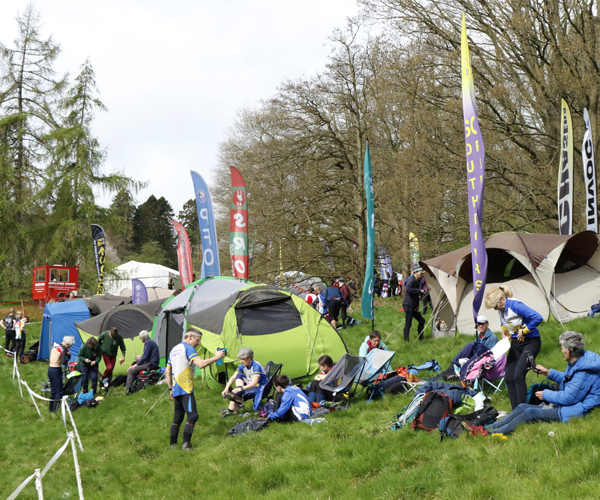
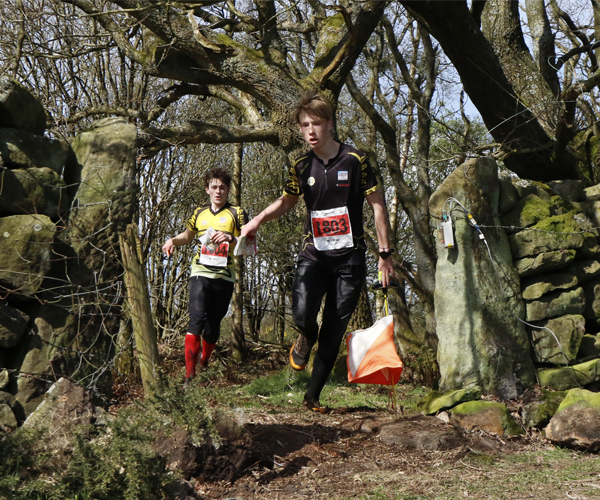
Learn more about BOC 2024 via the website.
With thanks to Wendy Carlyle for providing these images from the weekend. Full library available here.
Latest News
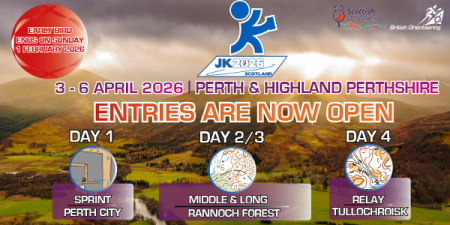
JK 2026: Entries are officially open, and the early bird entry ends on 1 February 2026!

Entries are open for the British Middle Championships 2026
